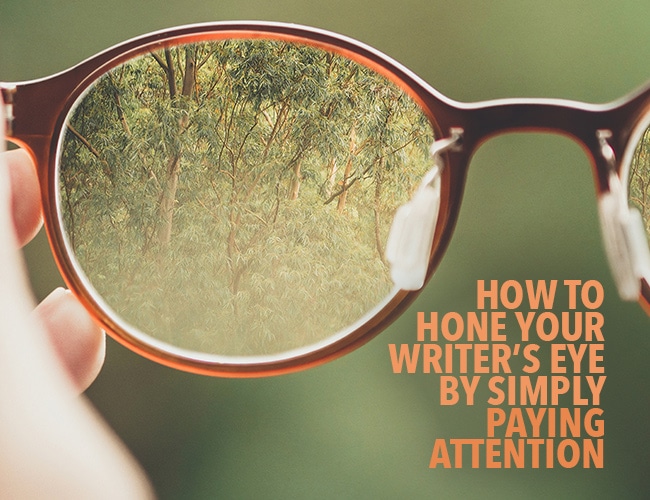The best writing teacher is the world around you — if you only learn to pay attention. Ready to develop your writer's eye? Here's how to see the stories all around you.

What are you learning?
Sometimes it feels like I can’t learn things fast enough. I’ve been working to improve my ability to evoke emotion in my writing. It’s been harder than I think it should be, and I often lament that I don’t have enough time to learn all I need to learn to make my fiction work.
But as I wring my hands thinking I don’t have time, I’m missing a great opportunity right in front of me every day. Being present, paying attention, and thinking about the world I see are all excellent ways to learn. When I look at the world through a writer's eye, I see writing lessons all around me.
The teacher
I was at the grocery store this past weekend. (I know. Super Bowl weekend shopping = dragon slaying.) I weaved through the basket-packed aisles, saying “Excuse me” and “May I?” more times than I can count. The people were faceless, moving extensions of their carts or tumbling paper towel packages.
Then a gray-haired, leathery-skinned man in a patched leather coat and a black ball cap with “SPECIAL FORCES” embroidered across the back in bright yellow zoomed past me. He was in pursuit of his wife. She was no-nonsense, her list in one hand, each jar decisively tipped from the shelf and in one swift movement into the cart.
Her husband hunched over the buggy, his eyes darting left and right as he maneuvered down the aisle after her, like it was his special mission to choose the best route. I tried not to stare each time we passed, but he was a character, shape-shifting as he progressed through the store.
In the cereal aisle, he straightened his arms and pushed the cart out in front of him as if it held the queen. He marched by in a steady cadence.
In front of the dairy cases, he slumped his shoulders and made the front of the cart jiggle like it had a broken wheel, and people cleared his path, his head nodding at each in silent apology.
In the paper goods aisle, he got waylaid by the flashlights until he was summoned and then he turned the cart on a dime and sped to his wife who rolled her eyes playfully.
By the time we crossed paths in produce, I couldn’t hide my amusement. As I headed to the checkout, he winked, and I wondered if the entire performance had been for me.
It made me smile all the way to the car and I’m still thinking about it a week later. His movements, his carriage, his clothes — all of these were a master class in characterization.
Even a tired trip to the grocery store is full of lessons that carry into writing.
The art of paying attention
My constant pursuit of learning sometimes manifests as stress. Self-inflicted, no less. But one of the best ways to battle stress is to simply be present in my life.
Worry is focused on future possibilities. Being present doesn’t require chanting or even closed eyes. It means I clear my mind long enough to see the world around me for what it is instead of what I’d like it to be.
It means I take time to stare and wonder.
The best writing is specific and the only way to get more concrete, more specific is to stare at things. To look at the parts. To pay attention to the details. To ask questions about the world around me. To look at the world with a writer's eye and notice what I see.
Daily mental practice: curiosity
If you spend any amount of time with small children, you will be delighted (perhaps also exhausted) by their endless curiosity. “What is that? Why does it do that? Why? How do you …” and on and on.
As adults, we often minimize our curiosity in pursuit of getting focused or being productive. Curiosity and focus don’t have to compete though. It is the act of “wondering” that has made advancements in every field of work.
As writers, we need to cultivate a curiosity practice. To look at the world and ask “What if?” and “I wonder what would happen …” That curiosity keeps us fresh, engaged, and it produces organic learning experiences useful for writing and life.
The next time you are in traffic or at the store or (God help you) in line at the Motor Vehicles Department, instead of getting impatient, get curious. Life is the best teacher if only we’ll listen.
Do you remember to pay attention to the world around you? Let us know in the comments.
PRACTICE
Go into a public space, like a grocery store, a mall, or a park. For fifteen minutes, observe the world around you. Write down everything you see.
Share your observations in the comments, and be sure to leave feedback for your fellow writers!
Sue Weems is a writer, teacher, and traveler with an advanced degree in (mostly fictional) revenge. When she’s not rationalizing her love for parentheses (and dramatic asides), she follows a sailor around the globe with their four children, two dogs, and an impossibly tall stack of books to read. You can read more of her writing tips on her website.



0 Comments